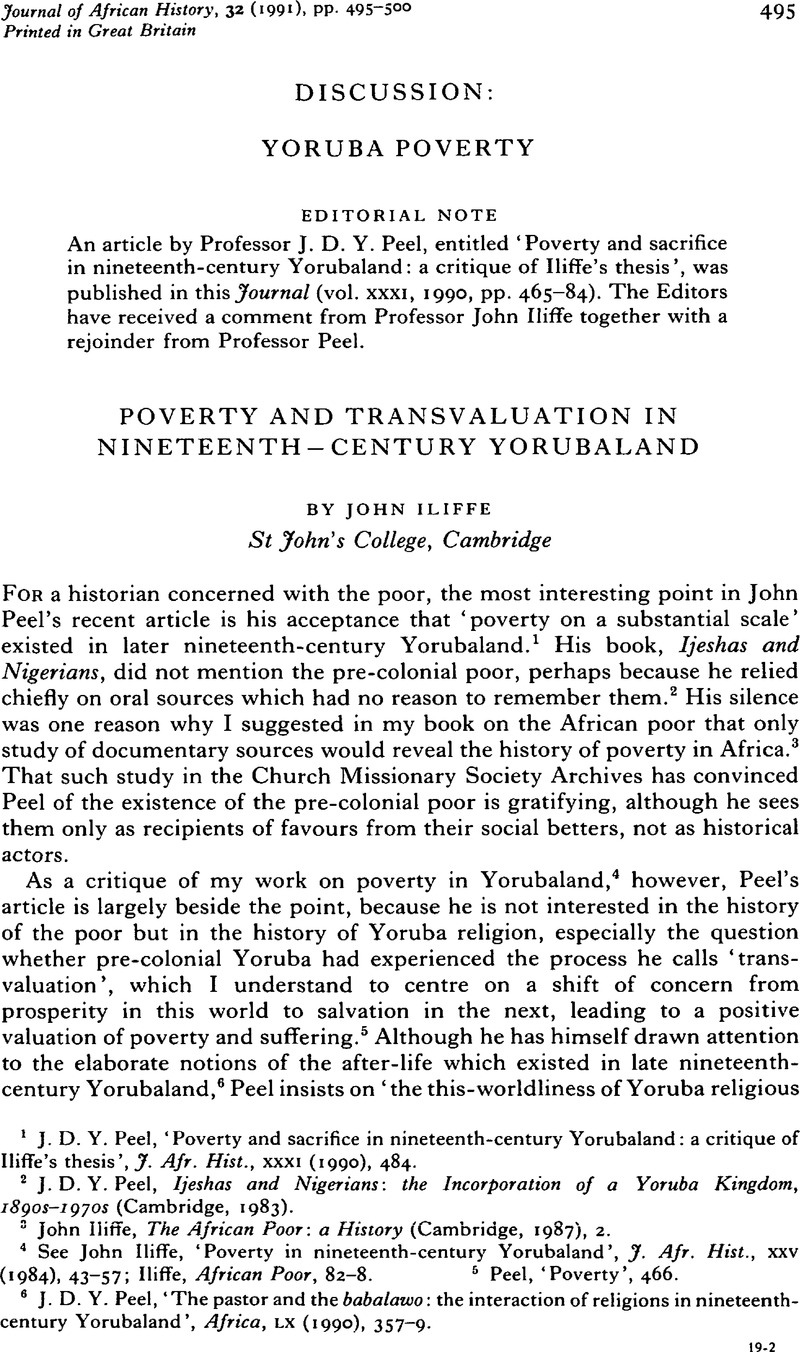No CrossRef data available.
Article contents
Poverty and Transvaluation in Nineteenth–Century Yorubaland
Published online by Cambridge University Press: 22 January 2009
Abstract

- Type
- Discussion: Yoruba Poverty
- Information
- Copyright
- Copyright © Cambridge University Press 1991
References
1 Peel, J. D. Y., ‘Poverty and sacrifice in nineteenth-century Yorubaland: a critique of Iliffe's thesis’, J. Afr. Hist., XXXI (1990), 484.Google Scholar
2 Peel, J. D. Y., Ijeshas and Nigerians: the Incorporation of a Yoruba Kingdom, 1890s–1970s (Cambridge, 1983).Google Scholar
3 John, Iliffe, The African Poor: a History (Cambridge, 1987), 2.Google Scholar
4 See John, Iliffe, ‘Poverty in nineteenth-century Yorubaland’, J. Afr. Hist., XXV (1984), 43–57Google Scholar; Iliffe, , African Poor, 82–8.Google Scholar
5 Peel, , ‘Poverty’, 466.Google Scholar
6 Peel, J. D. Y., ‘The pastor and the babalawo: the interaction of religions in nineteenth-century Yorubaland’, Africa, LX (1990), 357–9.Google Scholar
7 Peel, , ‘Poverty’, 477.Google Scholar
8 Ibid, 482.
9 Iliffe, , ‘Poverty’, 57.Google Scholar
10 Peel's article contains another misrepresentation which, although not germane to the present argument, must be refuted here in order to avoid later confusion. In ‘Poverty’, 466, he describes Goody's ‘contrast of extensive and intensive agriculture’ as ‘loosely correlating with Iliffe's two types of structural poverty’, i.e. labour-scarce and resourcescarce poverty. This is to miss a central point in my argument. I argued (African Poor, 14), for example, that Ethiopia (and perhaps Hausaland) in the nineteenth century had intensive agriculture (in Goody's terms) but labour-scarce poverty (in my terms).
11 Chambers's Twentieth Century Dictionary (new edition, Edinburgh, 1964), 59Google Scholar, gives as its primary definition of the adjective ‘ascetic’: ‘rigorous in mortifying the flesh’. Weber's definition is in Max Weber, Economy and Society (2 vols.) (ed. Roth, G. and Wittich, C., Berkeley, 1978), 1, 541–5.Google ScholarPeel, , ‘Poverty’, 479Google Scholar, appears to misunderstand Weber's distinction between asceticism and mysticism.
12 Peel, , ‘Poverty’, 466.Google Scholar
13 See Döhne, J. L., A Zulu-Kafir Dictionary (Cape Town, 1857), 253–4Google Scholar; Callaway, [Henry], The Religious System of the Amazulu: Part III: Izinyanga Zokubula; or, Divination (Springvale, 1870).Google Scholar
14 Peel, , ‘Poverty’, 472–3.Google Scholar
15 Iliffe, , ‘Poverty’, 54.Google Scholar See also Iliffe, , African Poor, 86.Google Scholar
16 Peel, , ‘Poverty’, 484.Google Scholar
17 Ibid. 469.
18 Ibid. 472.
19 Ibid. 470.
20 See Weber, , Economy, 1, 581–3.Google Scholar
21 Journal of Fox, H. W., 13 02 1847, in Church Missionary Record, XIX (1848), 41.Google Scholar
22 R[aghunathaji], K[rishnanatha], Bombay Beggars and Criers (3rd ed, Bombay, 1892), 8, 12–13, 69.Google Scholar (I have taken the author's full name from the British Library catalogue.)
23 Misra, P. K., ‘Nomads in a city setting’, in his Cultural Profiles of Mysore City (Calcutta, 1978), 33.Google Scholar
24 Lakshman, Prasad, ‘Beggar problem in an Indian provincial town’, Indian Journal of Social Work, XXI (1960–1961), 150.Google Scholar
25 Census of India, 1901: Volume XV: Madras: Part I: Report, by Francis, W. (Madras, 1902), 142–3Google Scholar; ‘The street music of Calcutta’ (1875), in Chaudhury, Pradip and Mukhopadhyay, Abhijit (eds.), Calcutta: People and Empire (Calcutta, 1975), 73Google Scholar; Raghunathaji, , Bombay Beggars, 47Google Scholar; Rolnick, Phyllis J., ‘Charity, trusteeship, and social change in India: a study of a political ideology’, World Politics, XIV (1961–1962), 442.Google Scholar
26 Aiyappan, A., Social and Physical Anthropology of the Nayadis of Malabar, Madras Government Museum Bulletin, new series, general, volume 2, part 4 (Madras, 1937), 43–4.Google Scholar
27 Reginald, Heber, Narrative of a Journey through the Upper Provinces of India (2 vols) (London, 1828), 1, 107.Google Scholar
28 Rig Veda 10.117.5, translated in O'Flaherty, Wendy Doniger, The Rig Veda: an Anthology (Harmondsworth, 1981), 69.Google Scholar
29 Romila, Thapar, ‘Dana and Daksina as forms of exchange’, in her Ancient Indian Social History: Some Interpretations (New Delhi, 1978), 115.Google Scholar
30 Cowell, E. B. (ed.), The Jataka or Stories of the Buddha's Former Births (7 vols) (Cambridge, 1895–1913), IV, 34.Google Scholar See also Lamotte, Etienne, Histoire du bouddhisme indien (Louvain-la-neuve, 1976), 79.Google Scholar
31 Johnston, E. H. (ed.), ‘The Buddha's mission and last journey: Buddhacarita, XV to XXVIII’, Acta Orientalia, XV (1937), 61.Google Scholar
32 See, e.g., Williams, R., Jaina Yoga: a Survey of the Mediaeval Sravakacaras, London Oriental Series 14 (London, 1963), 17, 25, 161Google Scholar, citing an author of c. A.D. 1100. (I owe this reference to Professor J. R. Goody.)


